
 To learn a language, you need to memorize a lot of vocabulary, and memorizing lots of vocabulary can be tricky. You’re faced with unfamiliar spellings and unfamiliar sounds, which makes foreign words significantly more difficult to remember than words in your native language. In this article, I’ll show you how to remember words more easily with the help of mnemonics.
To learn a language, you need to memorize a lot of vocabulary, and memorizing lots of vocabulary can be tricky. You’re faced with unfamiliar spellings and unfamiliar sounds, which makes foreign words significantly more difficult to remember than words in your native language. In this article, I’ll show you how to remember words more easily with the help of mnemonics.
Let’s start with some background.
What are mnemonics, really? In the broadest sense, they’re anything that helps you remember information. They can range from using your knuckles to figure out which months have 31 days, to using the name “ROY G BIV” for the colors of the rainbow. Or even elaborate codes that convert hundreds of digits of Pi into a simple story.
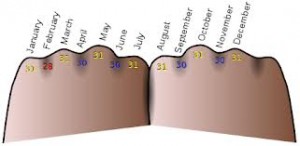
In general, mnemonics accomplish this through three main mechanisms:
- They condense large amounts of data into smaller chunks (Roy G Biv = 1-3 chunks, compared to 7)
- They turn abstract information into concrete pictures (Turtle punch is easier to remember than 3.1415926)
- They take advantage of spacial memory (The knuckle calendar is an example of this, but a better example would be the memory palace)
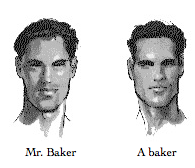 For our needs, we’re generally going to focus on mnemonics that involve concrete pictures. These take advantage of what’s known as the Baker-Baker effect. Basically, if I tell you that a man’s name is Mr. Baker, you’re going to forget that information relatively quickly. Names aren’t particularly memorable. But if I tell you that this man is a baker, you’ll remember.
For our needs, we’re generally going to focus on mnemonics that involve concrete pictures. These take advantage of what’s known as the Baker-Baker effect. Basically, if I tell you that a man’s name is Mr. Baker, you’re going to forget that information relatively quickly. Names aren’t particularly memorable. But if I tell you that this man is a baker, you’ll remember.
Why? Your brain stores sensory information (especially visual information) much better than abstract information. When I tell you that a man is a baker, you know precisely what that looks like. You may even precisely what that smells like, and what his bread tastes like. In contrast, “Mr. Baker” is just as memorable as “Mr. Hampson” - it’s basically only noise, and as such, it’s totally forgettable. Mnemonics are tremendously helpful for language learning, because languages are full of abstract, hard-to-remember concepts – like spelling, grammatical gender and verb conjugation patterns – and you can use mnemonics to turn these abstract concepts into simple, memorable pictures.
I started playing around with mnemonics late in my French (I had a few pictures for word genders), and then went nuts with Russian, creating mnemonics to help me remember word stress, gender, verb conjugation patterns, verb prefixes, noun cases, everything. Now, in Hungarian, I’m using them to remember spelling, too. I plan to cover all of these uses over the next few months, but in light of last week’s article, I’ll start with spelling.
As a caveat, I’m not going to give you a system for turning any spelling into an elaborate story. These methods exist, but they take so much work to set up and so much practice to work well that I don’t think they’re worth doing. The first system of this sort turned words like “Divinitatis” into stories like “Staphylus (a minor wine-god) was in a brothel getting harassed with a tree, while, in the background, a penitent, extremely well dressed man sits in a silver chair and raises his hands to heaven.” A bit too complex, no?
Other, more common techniques involve creating keyword mnemonics: cheval (horse) sounds like “shovel,” so I’ll imagine a horse digging a hole with a shovel. Keywords work fairly well, and I use them when I can, but they have some serious limitations. How can I use a keyword to help me remember the difference between Hungarian’s kor (period/era) and kór (disease). These two words sound almost identical; the only difference is that kór has a longer “o.” Kor reminds me of an apple core (and so I could picture an apple core sitting around, fossilizing over an entire era of history), but what do I do with kór? A really long apple core? Keywords have their place, but they won’t help here.
I’m going to give you a way to remember whatever letters you need – think of it as mnemonics à la carte. I usually use it to remember the first letter of every word I learn, and if I need another letter or two to help remind me of a particularly tricky word (say, an ó for kór, then I’ll add more mnemonics as needed.
To do this, I assign one image to every basic spelling/sound in my language. In French, I could use “cheval” (horse) to represent “ch.” From then on, I can reuse that horse in a variety of settings. Chat (cat)? A cheval is eating my chat. Cheveux (hair)? A cheval with elegant, long cheveux.
If you need help with multiple sounds/letters in a single word, you just add additional images. The stories get more complex, but they’re nonetheless memorable (at least for a few weeks). Over time, you eventually forget the stories and remember the spellings instead.
In Hungarian, I have kávé (coffee) for K, orvos (doctor) for O and óra (clock) for Ó. If I need help to remember the difference between kor (era) and kór (disease), then I can imagine a grizzled, impossibly old doctor sipping his coffee to help me with kor – that doctor’s been there for an entire era – and a gross, sore-encrusted clock oozing diseased goop into a coffee cup for kór (Sorry. It helps when your mnemonics are as vivid as possible.) I create these stories whenever I learn a word for the first time, or whenever I forget a word during my daily reviews. That way, I only spend time creating mnemonic stories when I really need it.
The nice thing about this system is that it keeps me thinking in my target language. I keep associating similar sounding words in my target language, which serves as a review for two words at once, every time I see a new word. So both words (cheval and cheveux, for instance) become easier to remember.
How do you keep track of all of your pictures? Simple: the same way you keep track of all of your words. Just use your Spaced Repetition System (and if you aren’t using a spaced repetition system like Anki, start already. They make life much, much easier). For spelling mnemonics, I add one flashcard for every spelling in my target language. It looks like this:
I’ll point out two things here.
One, I’m not asking for a specific mnemonic. I’m just asking for any word that has this spelling, though I am supplying a specific example on the back of this card. And given the “When you’re right, you’re right” principle behind my flashcards, there are a lot of correct answers to this card: chat (cat), cheveux (hair) and chevalier (knight), to name a few.
In the beginning of my Hungarian studies, I tried to be a bit more strict with my mnemonics – I only wanted one image per spelling/sound combination – but in time, that changed. As I learned more words with similar spellings, and as I associated them together using these mnemonics, I found that I had a bunch of words and images come to mind whenever I saw a certain spelling. I could pick any of those words as a mnemonic, and they worked just fine (better, even, than the fixed mnemonics). So now I use this more-flexible wording for the question on my flashcards; it’s easier to remember (all it does is make sure that I practice the ability to come up with images for any given spelling), and it helps me create big families of similar sounding words.
In practice, regardless of the wording, you’ll tend to remember the mnemonic you chose. Here, you’ll usually remember cheval before any other “ch”-words. Only later, after a month or two, will you start to remember a bunch of images at once. Once that happens, you can pick whichever one seems most appropriate to the new word you’re memorizing.
One more thing: I’m only testing a spelling here (“ch”), rather than a spelling/sound combination (“ch” as in “cheval/chat”). This isn’t a problem for languages like Hungarian, since every spelling only produces one possible sound. It’s even fine for languages like French, in which if you know a spelling, you’ll usually know the sound. But in a really irregular language like English or Tibetan, this can lead to some difficulties. How can you remember the difference between -ough as in “rough” and -ough as in “bough”? I can only think of two solutions for this: either you can get recordings of each sound alone (“uff” and “ow”, for the previous two examples) and stick those recordings on the front side of your cards, or you can use IPA to help you tell apart your oughs (ufs) from your oughs (owz):
A few final notes:
I don’t always use mnemonics. When a word is relatively familiar (a word like chèvre, for instance, may be pretty easy due to the cheese), I’ll skip the mnemonic entirely. And when I’m starting to reach an intermediate level, I find that I need them less and less. But even at intermediate and advanced levels, I’ll still run into words that just don’t want to stick in my brain, and mnemonics help me nail them down.
If you’re just starting out with a language, you can save a lot of time by using example words to learn spelling and then re-using those same examples for your mnemonics. I’m including a small example Anki deck with pre-made models for all of these cards. Play around with it and see how you like it. Back in December, I tried out these mnemonics for Hungarian on a whim, and I’ve found them extremely helpful. Hopefully they’ll be helpful to you, too!
Questions? Suggestions? Post in the comments section below! Like what you see? Subscribe to site updates! [wysija_form id="1"]




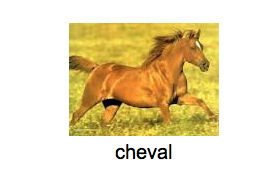
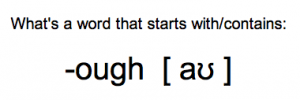
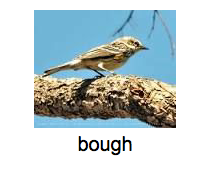
This is a very interesting subject. I have noticed that some people use mnemonics more easily or naturally than others. It seems to be a skill by itself — you have to “learn” how to properly use mnemonics, or you end up getting confused.
What you said about keeping them relatively simple is certainly true. At some point, memorizing the mnemonic is worse than memorizing the original fact! So you have to find some balance there.
Well I don’t agree here. I think the goal is to create a direct association between the foreign word and the idea. As long as you need a crutch to get the answer, you won’t be fluent. I would argue that when doing the anki cards, if you do not get the answer instantly, you need to fail the card and repeat until you do.
My immediate goal in French is to be able to listen to native French speakers talk at full speed and be able to understand it like I understand English. This is impossible if I build a foundation on mnemonics.
The mostly useful thing I’ve found is audio books. There are programs that allow you to reply them at speeds between 60-150% of normal. So I can start at 60% and slowly increase the speed, etc.
Good points! In terms of becoming reliant upon mnemonics to remember words, you’re right that it’s simply too slow to use in conversation. In my experience, that reliance is only temporary; once the cards get a bit more mature, I only retain a general sense of “oh, this word has something in common with other similar-sounding words,” which is exactly what I have in English.
As for the greater speed issue, you’re touching on a really fascinating aspect of memory. Every time you quiz yourself in Anki, you’ll run into some words that come instantly, others you’ve forgotten, and some that you can reach after a 3-10 second struggle. Here’s where it gets totally counter-intuitive. From an efficiency standpoint, you’ll get the most benefit from that THIRD group - the words you remembered, but just barely. And it’s not an insignificant difference; if you test yourself when you barely know a word, it’s up to TWICE as effective as testing when you know the answer immediately. This is one of the reasons spaced repetition works so well; it’s pushing you towards having a hard time remembering your words by increasing the intervals each time. Lately, I’ve been adjusting Anki’s settings to push me closer to that line, by increasing the default delays to 3-5 days instead of 1-4 days.
Granted, if you’re constantly practicing a language such that you’re always taking a long time to remember words (in the name of efficiency or not), you might find that your language comes too slowly when you need it. I’ll know a bit more about all of this through the course of this year, since Hungarian’s the first language in which I’ve really tried to constantly push as close as I can towards that line of barely remembering. But my initial impressions are that it works pretty well, I’m beginning to formulate sentences in my head, and I don’t see a huge speed problem. I suspect speed is best trained through speaking, so you can kind of have the best of both worlds that way: by training memory through Anki, and training speed through speaking.
Anyhoo, enough blabbering for now! Thanks for the comments!
Wow, very interesting, thanks for the post!
I’d like to make sure I understand your method:
If you are trying to remember a word like “chat” you would use say, an image of a horse (cheval) eating a cat, because horse and cat begin with “ch”? And the “ch” of chevel would be link or aid to chat?
And how would you design an Anki card?
Thanks in advance, Andrew
Hi Andrew
I think you’ve got it. If I needed help remembering “chat,” I could connect it to “cheval” by picturing a horse eating a cat. That’s just a mental tool; I wouldn’t add a picture of a horse eating a cat to my Anki card for “chat,” for instance.
The extra 2 Anki cards I talk about in the post are just to help you build up a collection of mnemonics for all of the spellings, so you don’t have to spend a bunch of time trying to come up with a good mnemonic for “ch”.
Hey Gabe,
I constantly wonder when I’m making new Anki flashcards: for you to learn faster, it’s better to make cards easier or harder to remember?
For example, writing a tip of the answer, or putting images that aids remembering or writing in parenthesis what “category” of answer is being demanded would be a better way of making flashcards or feeling your brain melt trying to remember a hard question is better on the long run?